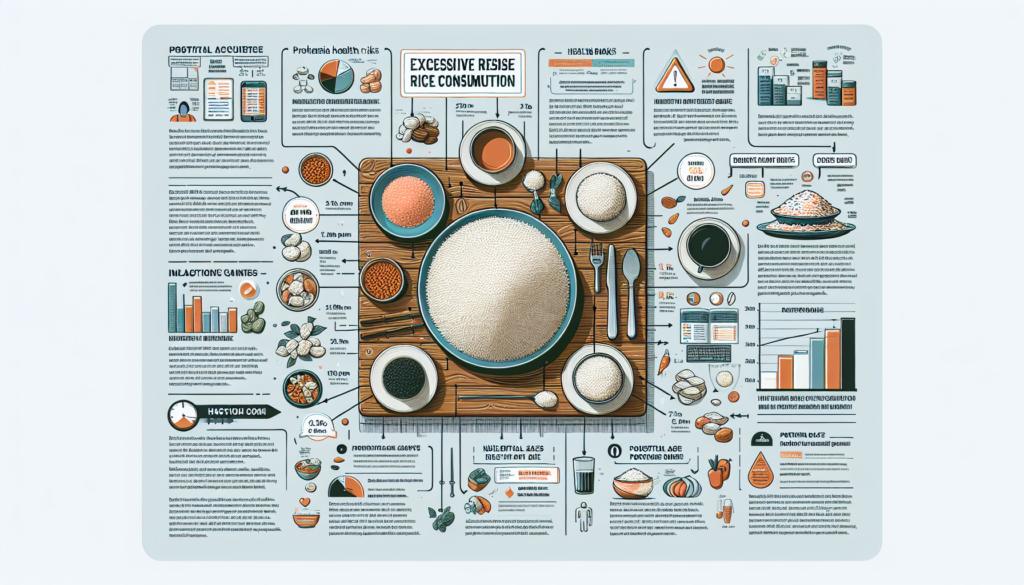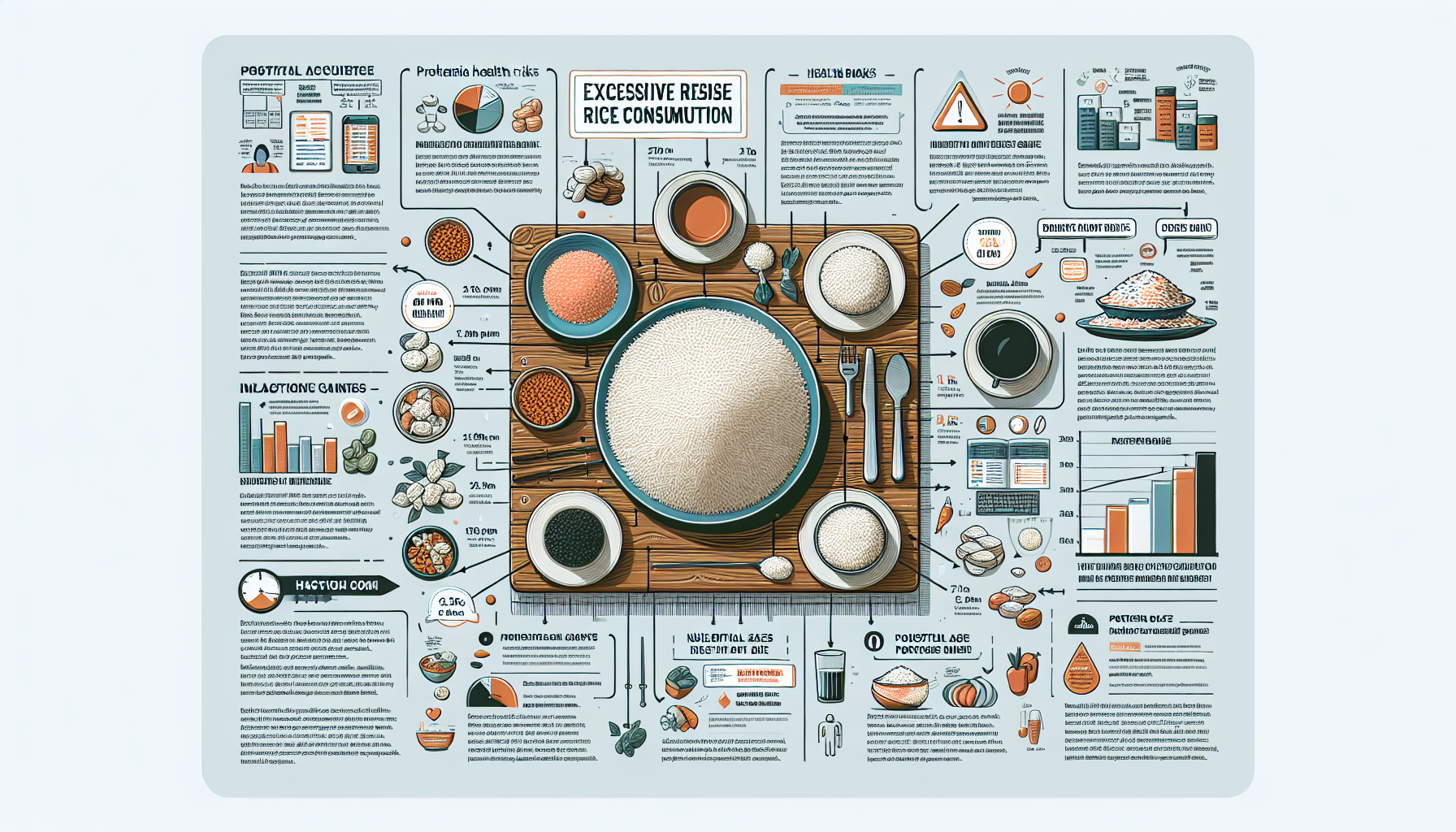Imagine this scenario: you’re sitting down to a delicious meal, and a heaping plate of rice is placed in front of you. You begin to eat, savoring each bite of the fluffy, flavorful grains. But have you ever wondered what would happen if you were to eat too much rice? In this article, we’ll explore the potential effects of consuming an excessive amount of this staple food. From its impact on your blood sugar levels to the potential for weight gain, get ready to discover the consequences of indulging in too much rice.

Digestive Issues
Bloating
If you find yourself feeling bloated after consuming rice, you’re not alone. Bloating is a common digestive issue that can occur due to the consumption of rice. It occurs when your stomach and intestines become filled with gas or air, leading to discomfort and a swollen abdomen. One possible explanation for bloating after rice consumption is that rice contains carbohydrates that can be difficult for some individuals to digest properly. This can result in the fermentation of undigested carbohydrates in the gut, leading to the production of gas and bloating.
Constipation
Constipation, another digestive issue that can arise from consuming too much rice, occurs when there is difficulty or infrequency in passing stool. Rice is a low-fiber food, and a lack of dietary fiber can contribute to constipation. Fiber plays a crucial role in promoting regular bowel movements and preventing constipation by adding bulk to the stool. Without enough fiber in your diet, your stool may become hard and difficult to pass.
Diarrhea
On the other end of the spectrum, consuming excessive amounts of rice can also lead to diarrhea. Diarrhea is characterized by loose and watery stools, often accompanied by abdominal pain and cramping. One possible reason for rice-induced diarrhea is that rice contains a type of starch called resistant starch. Resistant starch can pass through the small intestine undigested and reach the large intestine, where it can draw in water and contribute to loose stools.
Weight Gain
Caloric Intake
Eating too much rice can contribute to weight gain, as rice is a calorie-dense food. Each gram of rice contains approximately 4 calories, and when consumed in large quantities, the calories can quickly add up. If you regularly consume more calories than your body needs, the excess calories can be stored as fat, leading to weight gain over time.
Carbohydrate Overload
Rice is primarily composed of carbohydrates, and overeating rice can lead to a carbohydrate overload. When you consume carbohydrates, your body breaks them down into glucose, which is then used as fuel. However, if you consistently consume more carbohydrates than your body can use for energy, the excess glucose is stored as glycogen in your liver and muscles. Once your glycogen stores are full, any additional glucose is converted into fat and stored in adipose tissue, contributing to weight gain.
Blood Sugar Spike
Glycemic Index
The glycemic index (GI) is a measure of how quickly a food raises blood sugar levels. Foods with a high GI cause a rapid spike in blood sugar, while foods with a low GI result in a slower and more gradual increase. Rice, especially white rice, has a high GI, which means it can cause a rapid increase in blood sugar levels when consumed. This spike in blood sugar can lead to a range of issues, including increased hunger, cravings, and energy crashes.
Insulin Resistance
Consistently consuming high-GI foods like rice can contribute to insulin resistance. Insulin is a hormone that helps regulate blood sugar levels by facilitating the uptake of glucose into cells. When you consume a high-GI meal, your body produces a large amount of insulin to process the rapid influx of glucose. Over time, this constant barrage of insulin can lead to reduced sensitivity to insulin, making it harder for your body to lower blood sugar levels effectively. Insulin resistance is a risk factor for type 2 diabetes and can also contribute to weight gain.
Nutrient Imbalance
Micronutrient Deficiencies
While rice is a staple food for many, it can contribute to nutrient imbalances if consumed in excess. Including a variety of foods in your diet is essential to ensure you meet your body’s nutritional needs. Overreliance on rice as a primary food source can result in micronutrient deficiencies, particularly in essential vitamins and minerals such as iron, calcium, and certain B vitamins.
Protein Intake
Rice is also considered a low protein food, which can be problematic if it makes up a significant portion of your diet. Protein is crucial for various bodily functions, including muscle growth and repair, hormone synthesis, and immune function. Consuming inadequate amounts of protein can lead to muscle wasting, impaired immune function, and difficulties in recovering from injuries.
Arsenic Toxicity
Effects on Health
The presence of arsenic in rice is a growing concern. Arsenic is a naturally occurring element that can contaminate soil and water, potentially making its way into the rice crops we consume. Long-term exposure to high levels of arsenic can have adverse effects on health, including an increased risk of certain types of cancer, cardiovascular disease, and neurological problems.
Long-Term Risks
Consistently consuming rice that contains high levels of arsenic can lead to long-term health risks. The accumulation of arsenic in the body can result in chronic arsenic toxicity, which may manifest as skin lesions, respiratory issues, and digestive problems. Prolonged exposure to high levels of arsenic has also been linked to an increased risk of developing diseases such as diabetes and certain types of cancer, including bladder, lung, and skin cancer.
Gut Health
Microbiota Imbalance
The health of your gut microbiota, the trillions of bacteria residing in your digestive system, plays a crucial role in overall health and well-being. Consuming excessive amounts of rice can potentially disrupt the balance of your gut microbiota. Rice contains carbohydrates that act as a food source for bacteria in the gut. While some carbohydrates can promote the growth of beneficial bacteria, excessive intake can lead to an overgrowth of harmful bacteria, potentially causing digestive issues and compromising gut health.
Leaky Gut Syndrome
Leaky gut syndrome, a condition where the lining of the intestines becomes more permeable than normal, can also be linked to rice consumption. When the integrity of the intestinal lining is compromised, it can allow undigested food particles, bacteria, and toxins to enter the bloodstream, triggering an immune response. Symptoms may include bloating, abdominal pain, fatigue, and food sensitivities. While the exact cause of leaky gut syndrome is complex and multifactorial, excessive consumption of rice can be one contributing factor.
Arsenic Contamination in Rice
Sources of Arsenic
Arsenic contamination in rice can occur through multiple sources. One primary source is the soil in which rice is grown. Arsenic is naturally present in some soil types, and rice plants can absorb it from the soil as they grow. Additionally, arsenic-laden pesticides and fertilizers that may have been used in rice cultivation can contribute to contamination. The water used for irrigation can also be a source of arsenic, particularly in regions where groundwater is contaminated with this toxic element.
Risk Factors
Certain populations may be more at risk of consuming rice with high levels of arsenic. For example, individuals who live in regions where rice is a predominant dietary staple, such as parts of Asia, may be more exposed to arsenic contamination. Additionally, rice-based products such as rice cereals and rice milk, which are commonly consumed by infants and young children, may also pose a higher risk due to their potential for higher arsenic levels. Pregnant women and those who follow a rice-heavy diet are advised to be especially mindful of potential arsenic exposure.
Eating Rice vs. Other Grains
Diversity of Diet
While rice certainly has its place in a well-balanced diet, it is important to prioritize dietary diversity. Relying solely on rice as your primary grain source can limit the variety of nutrients you consume. Incorporating different grains into your diet, such as quinoa, barley, or whole wheat, can help diversify your nutrient intake and provide a wider range of vitamins, minerals, and beneficial plant compounds.
Alternatives to Rice
If you are looking to reduce your rice consumption, there are plenty of delicious alternatives to choose from. Quinoa, for example, is a versatile grain that offers a similar texture and can be used as a substitute in many rice-based dishes. Additionally, whole grains like barley, millet, and bulgur can add variety to your meals while providing different nutritional profiles. Experimenting with these alternatives can add excitement and variety to your diet while ensuring a well-rounded nutrient intake.
Portion Control and Moderation
Serving Size
When it comes to rice consumption, portion control is key. Paying attention to serving sizes can help prevent overeating and provide a better balance of nutrients. The recommended serving size for cooked rice is typically around 1/2 to 1 cup, depending on individual energy needs. Be mindful of portion sizes when preparing meals or eating out to avoid exceeding your body’s requirements.
Balanced Meals
Remember that a well-balanced diet consists of more than just grains. Incorporating a variety of fruits, vegetables, lean proteins, and healthy fats into your meals is essential for overall health and wellness. By creating balanced meals, you can ensure that your body receives all the necessary nutrients it needs to function optimally.
Conclusion
While rice is a staple food for many cultures and can be a nutritious part of a balanced diet, excessive consumption can lead to various health concerns. Digestive issues such as bloating, constipation, and diarrhea can arise from eating too much rice. Weight gain and blood sugar spikes can occur due to rice’s caloric content and high glycemic index. Nutrient imbalances and arsenic toxicity are also potential risks associated with excessive rice consumption. However, by practicing portion control, incorporating dietary variety, and being mindful of potential arsenic contamination, you can continue to enjoy rice as part of a healthy and diverse diet. Remember, a balanced approach to eating ensures that you receive all the essential nutrients your body needs for optimal health and well-being.



